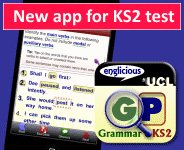Glossary: register
Explanation
'Register' is a broad description of the type of sociolinguistic context of written and spoken language, similar to genre in meaning.
Classroom lessons, football commentaries and novels use different registers of the same language, recognised by differences of vocabulary and grammar. Registers are ‘varieties’ of a language which are each tied to a range of uses, in contrast with dialects, which are tied to groups of users.
- I regret to inform you that Mr Joseph Smith has passed away. [formal letter]
- Have you heard that Joe has died? [casual speech]
- Joe falls down and dies, centre stage. [stage direction]
'Register' is frequently used to refer to the degree of formality/informality of a text (a property arising out of the situation), whereas genre tends to have a more traditional 'library classification' meaning (e.g. instructional/informative, fiction/non-fiction).
Englicious contains many resources for English language in schools, but the vast majority of them require you to register and log in first. For more information, see What is Englicious?

